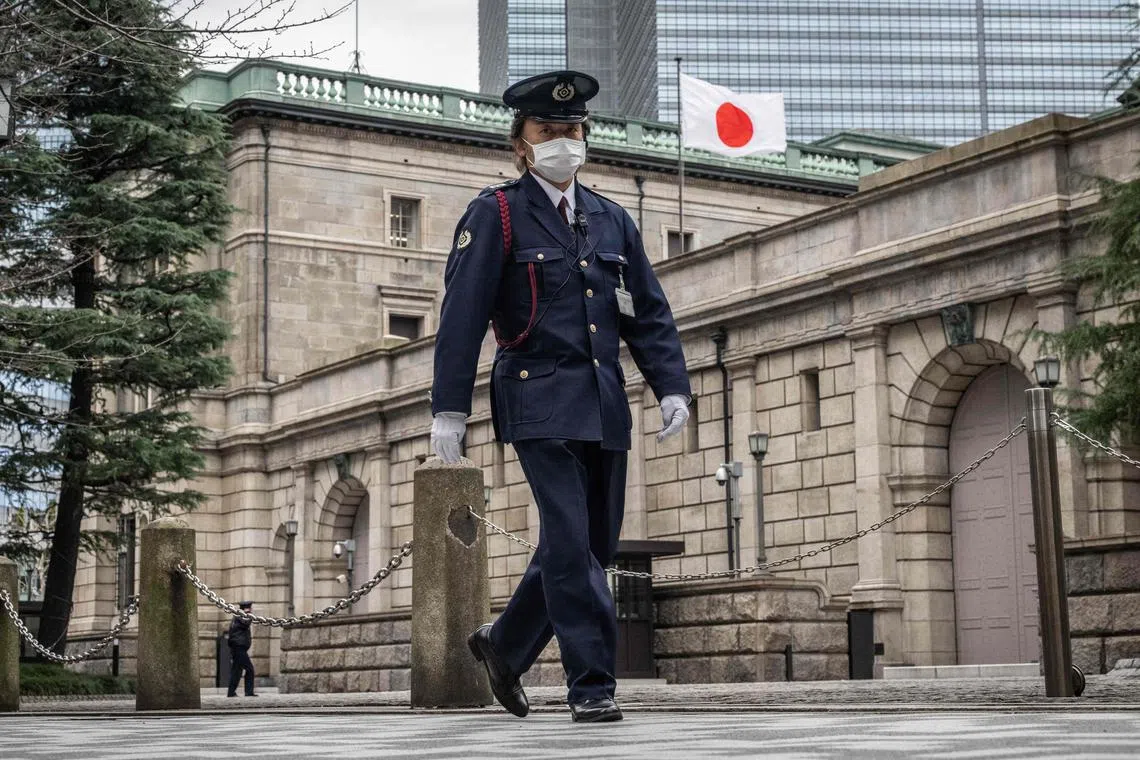Bank of Japan keeps low rates as Kuroda sticks to script at last meeting as chief
Sign up now: Get ST's newsletters delivered to your inbox

The Bank of Japan maintained ultra-low interest rates, leaving options open ahead of a leadership transition in April.
PHOTO: AFP
TOKYO – The Bank of Japan (BOJ) maintained ultra-low interest rates
Although widely expected by most analysts, the decision sent the yen and local bond yields tumbling as some investors unwound bets that retiring central bank governor Haruhiko Kuroda would tweak the yield curve control (YCC) at his last policy meeting.
Mr Kuroda leaves the bank with a mixed legacy: His massive stimulus is praised for pulling the economy out of deflation, but has been straining bank profits and distorting market function with prolonged low interest rates.
The BOJ maintained its short-term interest rate target at minus 0.1 per cent and that for the 10-year bond yield at around 0 per cent.
It also left unchanged a band set around the 10-year yield target that allows the yield to rise up to 0.5 per cent.
“The decision to uphold policy rates comes at a cost. The BOJ will be forced to continue its massive JGB (Japanese government bond) purchases to stem speculation of additional YCC tweaks, which will worsen market liquidity,” said senior economist Norihiro Yamaguchi at Oxford Economics.
The yen was last down about 0.49 per cent at 136.78 against the US dollar, trimming losses after a knee-jerk plunge of as much as 0.6 per cent following the no-surprises decision.
The benchmark 10-year JGB yield pulled back sharply from the BOJ’s 0.5 per cent ceiling to stand at 0.445 per cent, while the Nikkei average lost 1.23 per cent due to declines in bank shares.
Many investors expect the central bank to phase out YCC when Mr Kuroda’s successor, academic economist Kazuo Ueda, takes the helm in April.
“Ueda will not abruptly move and will probably wait until his second meeting in June in changing forward guidance and YCC,” said Mr Masamichi Adachi, senior Japan economist at UBS Securities.
“The BOJ will likely abandon its 10-year bond yield target, while maintaining negative interest rates, to arrest distortions in the yield curve,” he said.
For now, the BOJ has maintained its dovish guidance on the future policy path, saying that it expects short- and long-term policy rates to remain “at their present or lower levels”.
The central bank kept unchanged its view that Japan’s economy will likely recover. But it offered a bleaker view than in January on output and exports, saying they were “moving sideways”, in a nod to recent weaknesses in factory production and overseas demand.
In January, it said output and exports were increasing as a trend.
With inflation exceeding its 2 per cent target,
Mr Kuroda has repeatedly said consumer inflation, now running at double the pace of the BOJ’s 2 per cent target, will begin to slow as the effect of past spikes in fuel and raw material prices fades.
Data released on Friday showed that Japan’s wholesale prices rose 8.2 per cent in February from a year earlier to mark the second straight month of year-on-year slowdown, heightening the chance that the rise in consumer inflation will start to moderate in the coming months. REUTERS


